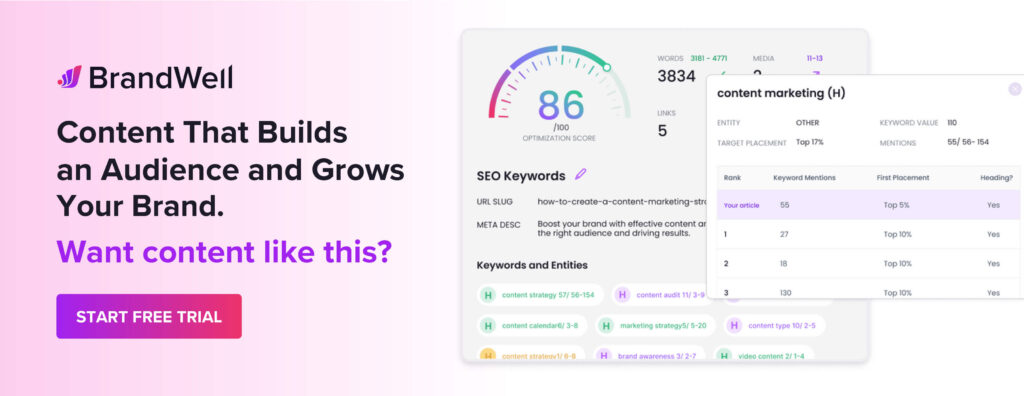Discover top guides, trends, tips and expertise from AIO Writers

ChatGPT created so much buzz back in November 2022 that over 1 million people signed up in the first 5 days, eager to test this revolutionary chatbot. By January 2023, ChatGPT had reached 100 million users!
With its ability to produce thoughtful, human-like responses to prompts/questions, ChatGPT has changed the way we write articles, emails, product descriptions, and even books. But is it a genuine AI writer that can publish SEO articles in seconds?
First, let’s talk about the difference between generalized AI writing tools and specialized AI writing tools.
ChatGPT, Jasper, and Rytr are examples of generalized AI writing tools. These apps are great for mass-producing all types of general, short content — whether it’s a tweet, an email, or a headline.
On the other hand, specialized content marketing tools like BrandWell are designed for a specific purpose — in this case, SEO-driven content.
Using BrandWell is essentially like having an army of content writers and SEOs, while ChatGPT is like having a chatbot writing assistant.
Let’s compare BrandWell vs ChatGPT and take a deep look at how each of these tools can affect your content production process.
Table Of Contents:
- BrandWell vs ChatGPT Overview
- The Revolution of Content Creation
- What is ChatGPT?
- What is BrandWell?
- 5 Key Differences Between BrandWell and ChatGPT
- BrandWell vs ChatGPT: Head-to-Head Showdown
- Pricing Breakdown
- BrandWell vs ChatGPT: Ready to Make Your Choice?
BrandWell vs ChatGPT Overview
If you don’t have time to read the whole article, here’s a quick comparison of BrandWell and ChatGPT.
- ChatGPT: Designed to generate humanlike text responses to questions/prompts at remarkable speed.
- BrandWell: An all-in-one brand growth platform that can do deep research, write all types of content, and offer a full suite of content intelligence tools from inside one app.
ChatGPT is great for a lot of things: It can find recipes, suggest headlines, recommend ideas for pet names, or even write a breakup letter. It’s a general chatbot that is a jack-of-all-trades but master-of-none. And it’s definitely NOT built for the purpose of content creation.
BrandWell, on the other hand, is designed for serious marketers who need powerful AI software for creating well-written, fully optimized content — on any topic! Plus, it integrates keyword research, content audits, tone/grammar checking, plagiarism scans, AI detection, and more.
Quantity
In terms of quantity, you can only send 25 prompts every 3 hours in ChatGPT. Meanwhile, with BrandWell, you can run hundreds of keywords in one go. Plus, BrandWell’s WriteWell suite can now also create landing pages, marketing copy, email newsletters, Amazon and Shopify listings, and posts for Facebook, Twitter, LinkedIn, or Reddit.
Ease of Use
To get an output that matches your expectations, you have to guide ChatGPT with highly detailed instructions. These specific prompts will improve your chances of getting a highly original piece that is written in your desired tone of voice. BrandWell, on the other hand, only requires a single long-tail keyword to produce a 2,000-word blog post in under 5 minutes.
Features
ChatGPT can answer any question about any topic, but that’s all it can do. While it does a good job with the research and writing part, it doesn’t have any other features beyond that. You can’t even edit its output unless you copy-paste it to Word or Docs.
Meanwhile, BrandWell has all the formatting and structure of an SEO blog. Right on the dashboard are all the great tools you need — so you’re essentially replacing Surfer SEO, Yoast SEO, and MS Word/Google Docs with an all-in-one content production app.
You don’t even have to edit your work on WordPress because you can do that right inside RankWell and it will mirror those changes on your WP site in real-time.
And guess what? BrandWell can now replace ChatGPT! The recently launched Version 3.0 comes with its own generative AI chatbot called AIMEE along with AI agents trained to write in 40+ content formats.
Sure, ChatGPT can write you a well-written short essay, but BrandWell gives you a complete piece of high-ranking, 100% original content with features that significantly enhance the quality and readability of your articles. These features include:
- H2, H3, and H4 headers to create white space.
- A featured image that represents what your topic is all about.
- Key takeaway boxes that summarize your article sections for busy readers.
- Click to tweet links that encourage readers to share your content.
- FAQ boxes that help Google categorize your article and show it to the right people.
- Internal and outbound links that help readers learn more about the topic and help Google easily find your content.
- SEO title, meta description, and URL slug.
- Live SEO score, NLP optimization, deep keyword insights, and an SEO checklist.
- Plagiarism checks.
- AI detection.
ChatGPT and BrandWell both use machine learning algorithms to generate text, but here are some of their key differences.
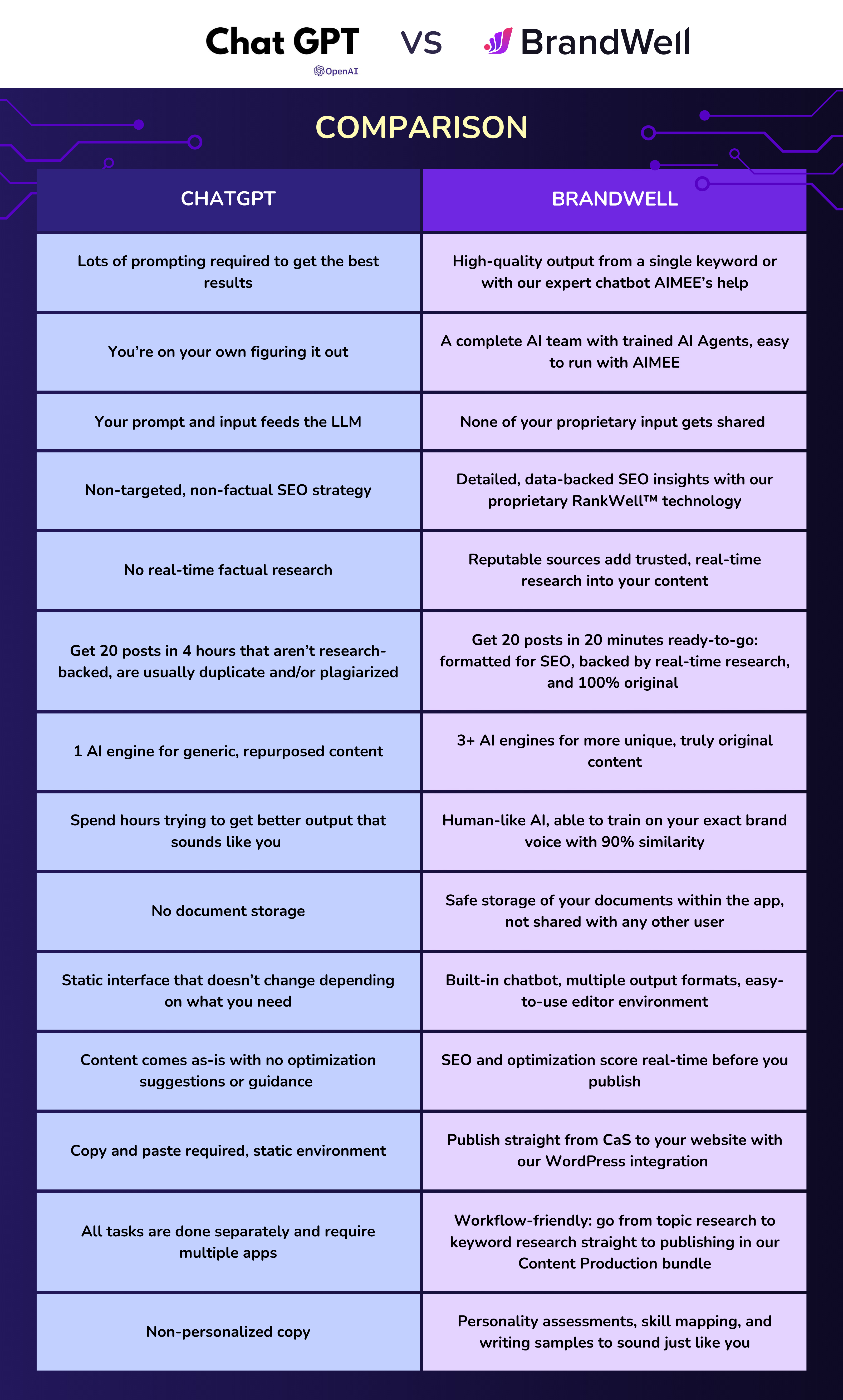

This is just a barebones overview of BrandWell vs ChatGPT. Now, let’s put some flesh on those bones.
The Revolution of Content Creation
AI-powered tools like BrandWell and ChatGPT have transformed the content creation process, enabling marketers to keep up with the demand for high-quality written content while improving productivity. However, these technologies offer two unique approaches to generating that content.
What is ChatGPT?
Developed by OpenAI, ChatGPT is a chatbot that uses machine learning algorithms and Reinforcement Learning from Human Feedback (RLHF) to answer questions on any topic.
Built on a neural network that enables humans to interact with computers using real-life dialogue, ChatGPT can produce such creative writing outputs as essays and song lyrics.
For example, in the prompt field you can ask ChatGPT to:
“Write a long-form blog post around the keyword marketing AI tools that will rank at the top of Google, in the style of Julia McCoy.”
You could probably get a 500-word article that’s good enough to publish after some editing and formatting.
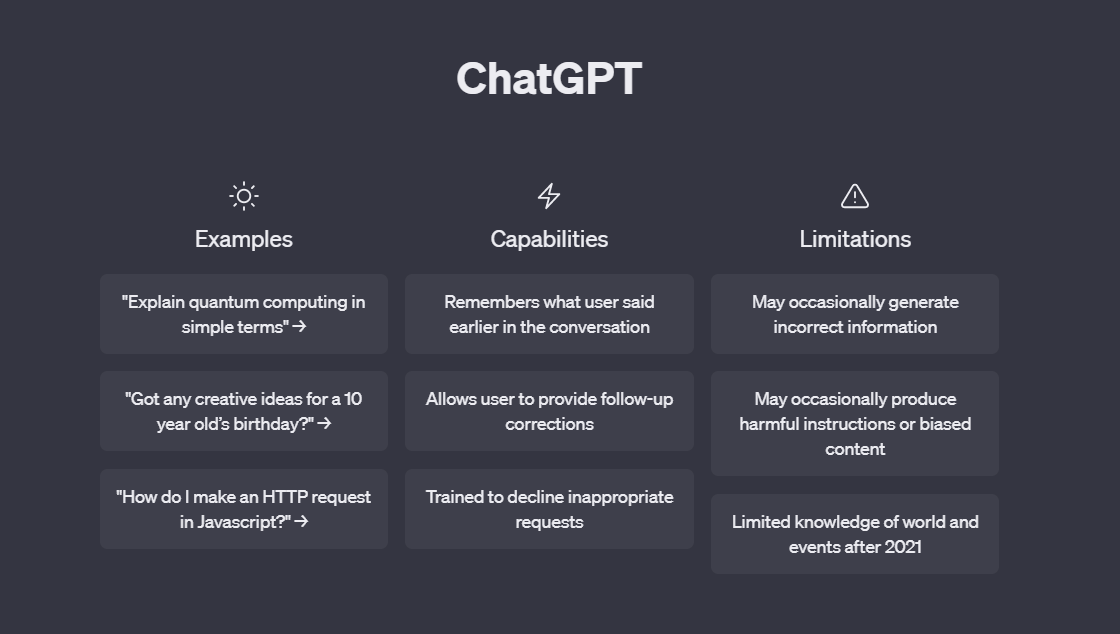

How Does ChatGPT Work?
ChatGPT is a language learning model (LLM) that uses a massive database of information to form human-like dialogue by predicting the next word in a sentence, and the next sentence after that. Relying on a language model that was trained using 570 gigabytes of general knowledge text and human feedback, the software can be used with great proficiency to accomplish all manner of tasks, including writing.
Like humans, ChatGPT doesn’t need to be taught to perform specific tasks. It can use its large knowledge base of data to work out ways to perform them.
But unlike you and me, the chatbot is designed to be a super-brain that can instantly recall information and respond to a prompt.
Using an intuitive interface that simulates a natural, engaged conversation, ChatGPT has potentially limitless applications. It can do many things that previously only humans could do, from coding to solving mathematical problems.
ChatGPT is also trained to take human feedback and use it to revise its answers and expand its “brain.”
ChatGPT’s Limitations
ChatGPT has been criticized for generating inaccurate or outdated information and may possess biases.
To address the limitations of ChatGPT content, OpenAI focuses on training its models with the goal of achieving helpfulness, truthfulness, and harmlessness. By refining the data used during the model’s training process, developers aim to minimize inaccuracies while maximizing the value provided to users.
- Helpfulness: The AI should be able to provide relevant responses based on user input or specific questions asked.
- Truthfulness: Responses generated by AI must contain factual information without misleading users.
- Harmlessness: The AI should not generate any harmful or offensive content that could negatively impact users or target audience members.
What is BrandWell?
BrandWell is a powerful all-in-one brand growth platform with humanlike writing capability and next-level publishing features. It is a proprietary tool that is designed to perform one task — create SEO content — which it does exceptionally well.
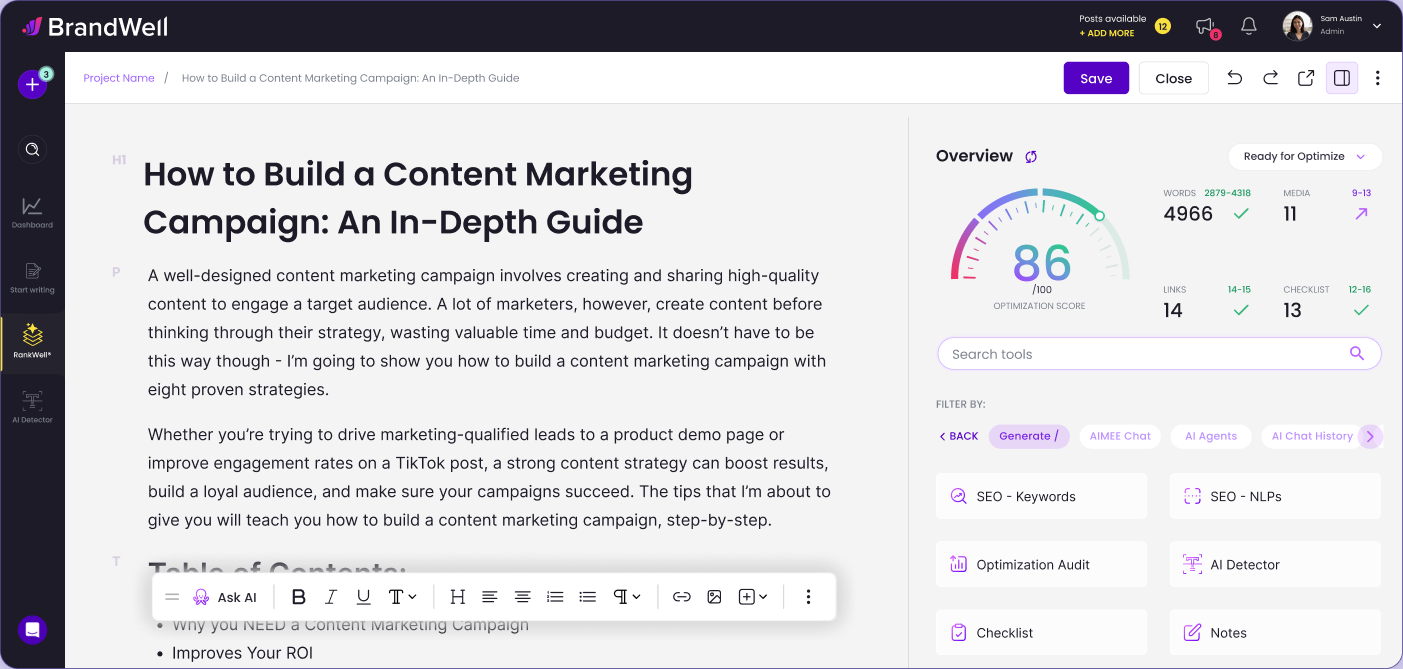

How Does BrandWell Work?
The core engine of BrandWell is its long-form SEO content writer. The RankWell® suite allows you to generate an original, fully optimized, publish-ready blog article from a single keyword or the URL of an existing blog post, YouTube video, or podcast.
Once you hit the “Write Post” button, the machine will search for the highest-ranking pieces of content around your topic and write a fresh blog post based on that information.
After a few minutes, the article will appear on the dashboard, ready for tweaking and proofreading. This baseline draft comes with an AI-generated title, URL, meta description, headers, introduction, and conclusion which you can edit, rewrite, or remove. You can also add custom headings and sections by clicking the “H” icon on the toolbar in case the AI missed anything.
To make your article more reader-friendly, you can add images, videos, infographics, and embedded tweets right on the editor and they will all sync with your WordPress blog.
Once you’re done reviewing and editing the text, scroll through the right column to start optimizing your blog post. On the Optimization tab, you will see your current SEO score and a list of keywords to help improve it. There’s also an SEO checklist on the next tab for more customization options.
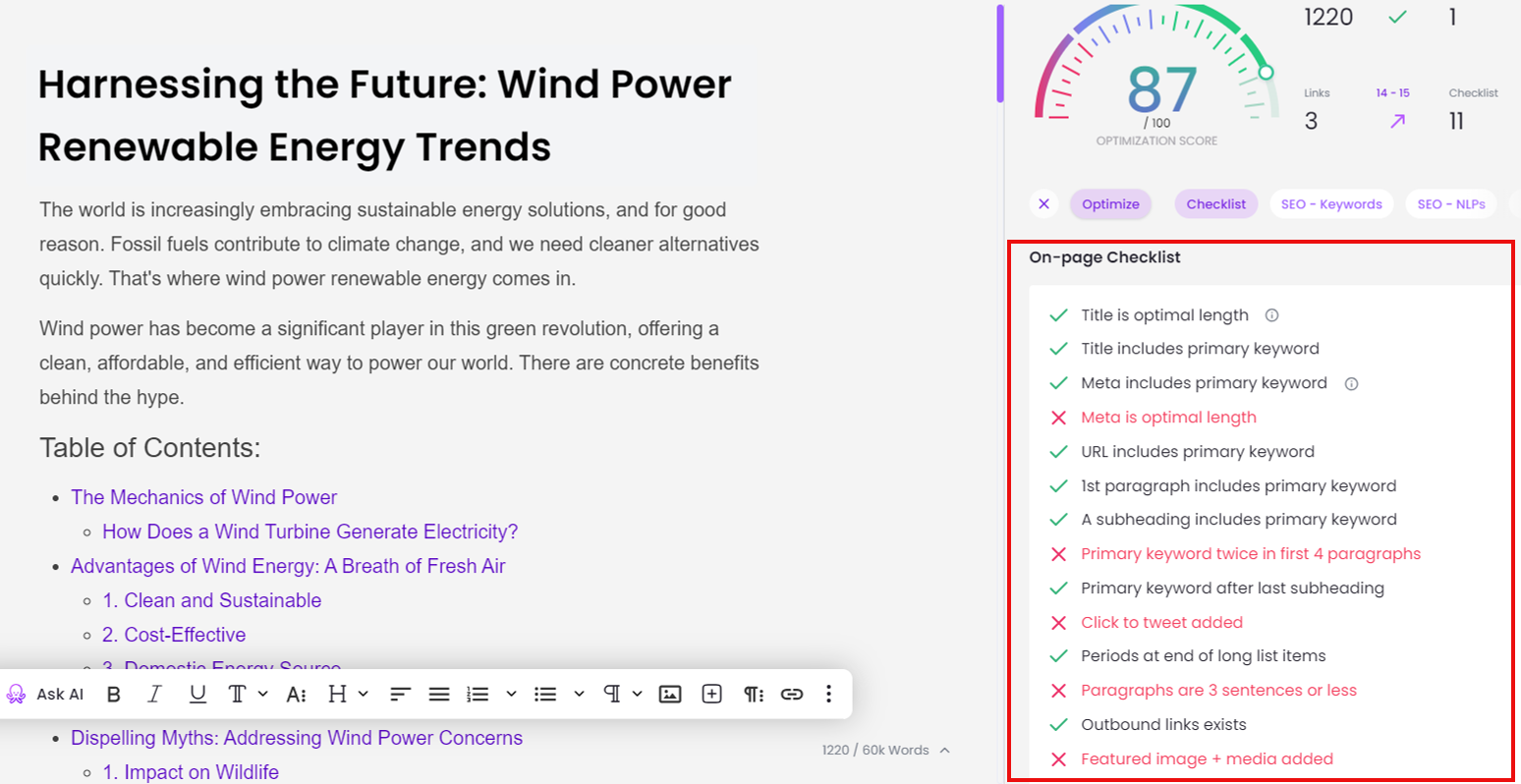

BrandWell also has a generative AI component called WriteWell that helps you create content that not only mirrors your brand but also resonates with your audience. The key features of this suite are AI Agents and the AIMEE chatbot.
These virtual assistants help you cook up killer content for specialized tasks, including marketing, copywriting, campaign strategy, e-commerce, and branding – just like building your own AI team!
Here’s a recent post that the AI agent for LinkedIn Story Post with Formula wrote for me:
And here’s our AI Director, Jeff Joyce, creating an entire 8,000-word ebook with AIMEE:
RankWell also includes an SEO intelligence suite designed to supercharge your content and ranking potential – without ever leaving the app.
RankWell allows you to:
- Discover opportunities with keyword research and topic clusters.
- Compare your content to top-ranking pieces in real time.
- Build targeted content briefs from detailed topic reports.
- Run optimization audits to pinpoint SEO and performance issues — and fix them on the spot.
- Get insights from Google Search Console on site-wide changes so you know which content pieces to merge, purge, or tweak to surge in the rankings.
The RankWell tech stack has three key features: Topic Reports, Content Briefs, and Optimization Audits. You can access these tools from the Content Intelligence dropdown on your BrandWell dashboard.


Topic Reports lets you analyze the word count, readability, and frequency of keywords, headlines, paragraphs, and images of the top 50 organic competitor results.


From these topic reports, you can create Content Briefs and customize and format your content before the AI writes it.


When your article is ready, click the Optimization Audit button on the SEO sidebar to see how you can further improve your content’s ranking potential.
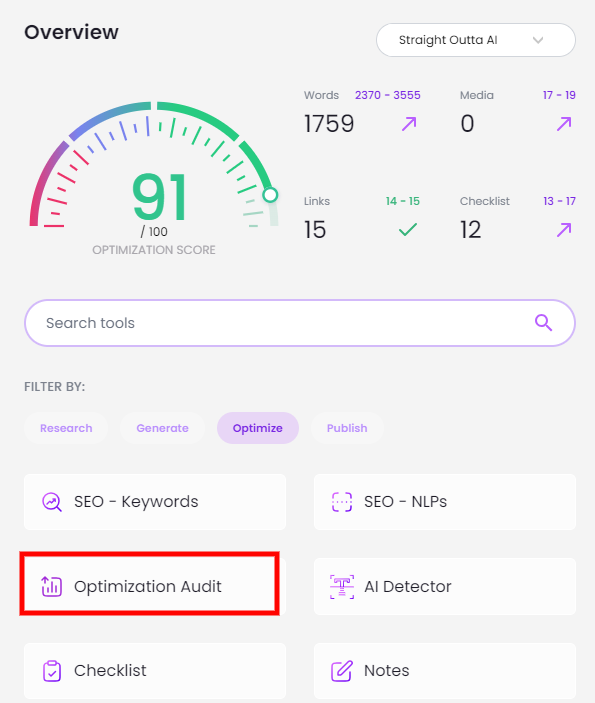

From the audit results, you can then optimize your post based on the suggestions on the checklist.
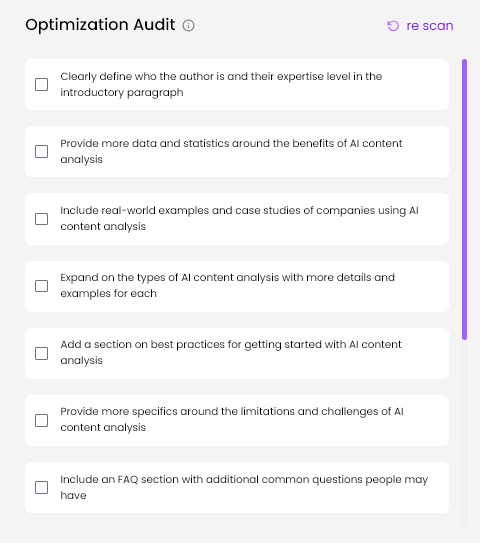

BrandWell 3.0 comes with two proprietary technologies: The BrandWell AI Detector and The BrandWell Plagiarism Checker.
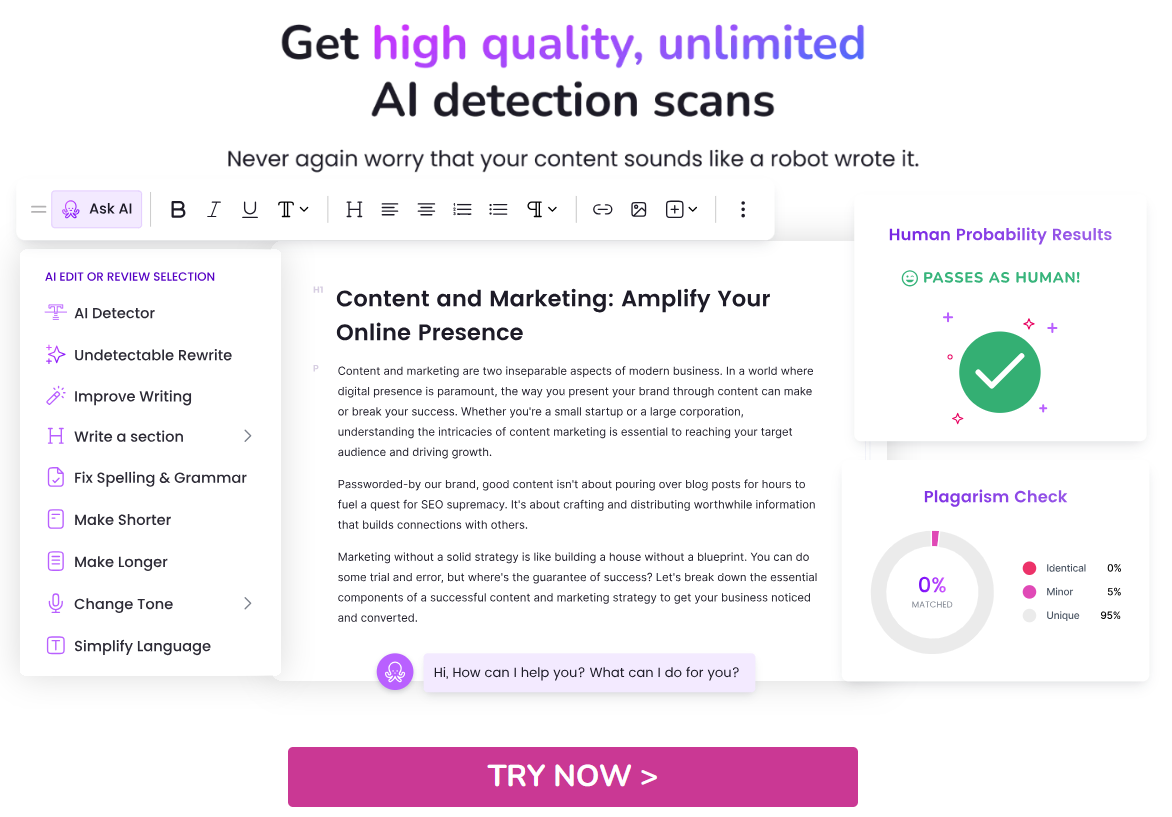

Run a plagiarism check to make sure your content is 100% original, and then humanize your AI-generated blog post with the AI detector.
Both are free tools that you can access from any browser or inside the BrandWell app.
5 Key Differences Between BrandWell and ChatGPT
The biggest difference between ChatGPT and BrandWell is that the former is just a clever chatbot that can answer any query while the latter is a smart, brand growth engine that could replace your entire arsenal of tools.
In place of the Word/Docs-style text editor you get with BrandWell, ChatGPT has a two-way dialogue-style interface. You can ask the chatbot pointed questions and, if you aren’t satisfied with the answer, you can ask more follow-up questions. You can then put together these short answers given by ChatGPT and format them into a usable long-form article.
But all this takes a lot of work!
The point of adopting artificial intelligence is to make your job simpler, which is what BrandWell accomplishes if your goal is to scale your content marketing efforts without hiring more human writers.
So while ChatGPT features ground-breaking tech that gives it remarkable capabilities, it cannot write SEO-optimized content that’s ready to publish in the same way that BrandWell does.
Let’s break down five key differences between the specialized AI content marketing powerhouse and the chatbot.
1. Snippets vs. Long-Form
Given its ability to generate essays and present them in a conversational format, ChatGPT can be adapted for AI content writing.
However, ChatGPT does not understand word count requests. It seems the AI cannot generate text longer than what typically counts for a short-form article.
Quite frankly, no other tool on the market today is more adept at writing long-form articles than BrandWell.
2. Writing Assistant vs. End-to-End Publishing Tool
ChatGPT cannot generate a complete article. This limitation reduces ChatGPT to a mere question-answering chatbot. It does, however, write text quite well and is useful for ideation and highly specific tasks like writing headlines, outlines, introductions, lists, and conclusions.
In contrast, what sets BrandWell apart is its extensive suite of writing, SEO and publishing features that elevate the depth, readability, and reach of your content.
3. Complex vs. Seamless Workflow
Content writers have quickly found a workaround for ChatGPT’s limited word count. Their solution is to come up with questions to ask the chatbot for each section of the article and then compile these answers to make a long article.
While that works, the constant copy-pasting from ChatGPT to your document editor further complicates your workflow.
Meanwhile, BrandWell takes your keyword to your blog in just a few clicks. It even comes with a plugin that automatically publishes your article on WordPress or Shopify without leaving the platform.
By the time you finish copy-pasting ChatGPT responses to your text editor, you could have written and published dozens of articles and ad copies with WriteWell!
Add all of the SEO tools of RankWell and what you get is an enterprise-level AI content marketing service that streamlines your workflow and scales your content publishing more efficiently.
4. Made-Up Facts vs. Fact-Checked Writing
ChatGPT can’t search the internet for factual and up-to-date information. What it knows is limited to what it was trained for — which is information up to the year 2021.
But that’s not the most troubling part of ChatGPT. What’s more worrisome is that it will try to make up something if it doesn’t know the answer, and do this with great confidence.
ChatGPT’s tendency to make up facts is a huge problem for publishers not just because it adds more burden to the human editor but, more importantly, publishing fake news or inaccurate data can be a reputation-ruiner and a trust-breaker with audiences.
With BrandWell, the accuracy issue is much less prevalent. Its output comes with links to related content on authoritative websites. And although you should still fact-check articles written by BrandWell before going live, the extra work is minimal.
5. Inherent Bias vs. Neutral Text Content Generator
The ChatGPT AI is trained to be truthful, harmless, and helpful. While that’s OK, the articles tend to steer towards positive tones even for content that may occasionally need to take a negative tone to accurately convey a point.
Conversely, BrandWell is not programmed to avoid negativity. Instead, it allows you to add a brief to give context to the article.
BrandWell vs ChatGPT: Head-to-Head Showdown
Ready to pit BrandWell vs ChatGPT? We put them to the test to compare their performance when writing long-form content.
ChatGPT
ChatGPT is not built for document writing and editing in general. In simple terms, you ask the chatbot a question and it answers you back. You can reply with feedback and ask it to paraphrase or refine its answer.
So while ChatGPT can produce essay-type answers to questions with impeccable grammar and in your preferred tone, the output is barely publishable.
To test how well ChatGPT can write an optimized long-form article, I gave it this prompt:
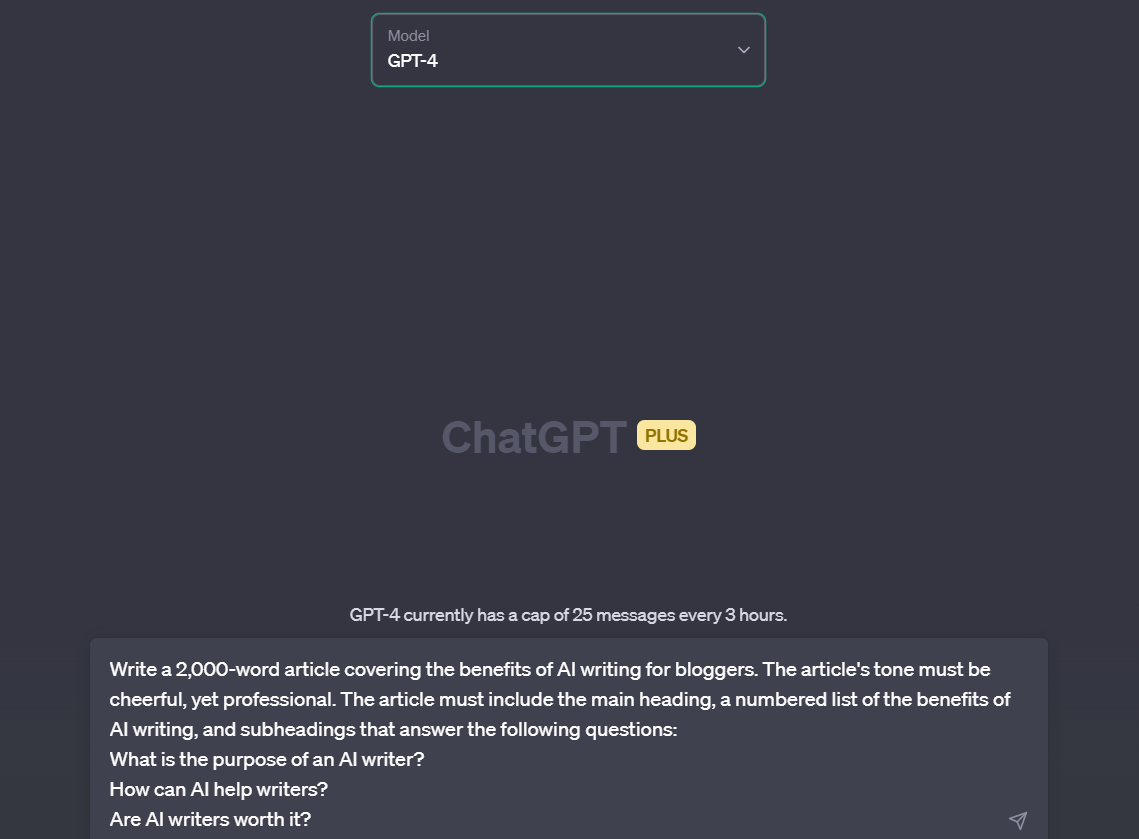

And this is what ChatGPT wrote:
Title: The Cheerful Benefits of AI Writing for Bloggers: A Comprehensive Guide
Introduction:
The world of blogging has undergone a radical transformation with the advent of artificial intelligence (AI) writing tools. These cutting-edge technologies are not only enabling bloggers to create high-quality content more efficiently but are also helping them stay ahead of the curve in an increasingly competitive landscape. In this article, we’ll explore the numerous benefits of AI writing for bloggers, as well as answer some common questions about the purpose and value of AI writers.
Main Heading: The Top 10 Benefits of AI Writing for Bloggers
Increased productivity
AI writing tools are designed to help bloggers create content at an accelerated pace. By automating certain aspects of the writing process, these tools enable bloggers to focus on their core expertise – crafting engaging stories and insightful analyses – without being bogged down by mundane tasks.
Consistent content quality
With AI writing tools, bloggers can maintain a consistent quality of content. These sophisticated algorithms can analyze and replicate a blogger’s writing style, ensuring that each piece is written to the same high standard.
Improved SEO optimization
AI writing tools are equipped with advanced natural language processing capabilities, enabling them to analyze and understand the keywords and phrases that drive traffic to a blog. By incorporating these SEO best practices, AI writing tools can help bloggers create content that ranks higher in search engine results.
Streamlined editing and proofreading
AI writing tools can detect grammar, punctuation, and spelling errors, as well as suggest improvements in sentence structure and word choice. This not only helps bloggers save time but also ensures that their content is polished and professional.
Enhanced creativity
By offering suggestions and ideas based on a blogger’s chosen topic or theme, AI writing tools can help spark creativity and inspire fresh perspectives. Bloggers can use these suggestions as a springboard for their own unique content, expanding their repertoire of ideas and approaches.
Personalized content generation
AI writing tools can analyze a blogger’s audience and tailor content accordingly. This means that bloggers can create highly targeted content that appeals to their specific readership, increasing engagement and loyalty.
Multilingual capabilities
For bloggers looking to reach a global audience, AI writing tools offer the advantage of multilingual content creation. With support for multiple languages, these tools can help bloggers create content that resonates with readers around the world.
Reduced writer’s block
With AI writing tools at their disposal, bloggers can overcome the dreaded writer’s block. By providing a constant stream of ideas and suggestions, these tools help bloggers maintain a steady flow of inspiration and creativity.
Cost-effectiveness
For many bloggers, hiring a team of writers or editors can be prohibitively expensive. AI writing tools offer a cost-effective alternative, allowing bloggers to access professional writing assistance without breaking the bank.
Scalability
As a blogger’s audience and content demands grow, AI writing tools can effortlessly scale to meet these needs. This means that bloggers can continue to produce high-quality content without being overwhelmed by the increasing workload.
Subheading: What is the purpose of an AI writer?
The primary purpose of an AI writer is to assist and augment the content creation process for bloggers, writers, and other content creators. By harnessing the power of advanced algorithms and machine learning, AI writers can automate various aspects of the writing process, including generating ideas, optimizing content for SEO, editing, proofreading, and even creating personalized content for specific audiences.
Subheading: How can AI help writers?
AI writing tools offer a multitude of benefits to writers, including:
Generating ideas and suggestions to inspire creativity
Maintaining consistent content quality
Ensuring proper grammar, punctuation, and spelling
Offering multilingual support for global reach
Streamlining the editing and proofreading process
The article looks great grammar-wise, and it contains reasonably accurate information. But at just 617 words, that’s nowhere near what I requested.
I had specifically asked for 2,000 words of content and gave enough context to create a fairly comprehensive article.
The chatbot did add the subheadings I asked for but ignored my request for the numbered list of the benefits.
ChatGPT Content Generation
The ChatGPT interface simply allows you to ask a question, get an answer, ask a follow-up question, and provide feedback. You can’t edit or correct the generated text without leaving the chatbot.
You also can’t import or export anything. You have to copy the answers the chatbot gives you and paste them into your Google Docs, MS Word, or another document editor.
Can ChatGPT Optimize an Article for SEO?
ChatGPT has no features for uploading keywords, an outline, or a brief to give context to what you are asking the AI. Perhaps that’s because it is designed for you to ask for those directly.
The chatbot does know what SEO is and can even provide a list of keywords to use if you ask it. But many of its suggestions are weak and not very useful for serious on-page SEO.
Is ChatGPT Content Detectable?
All the noise around ChatGPT has led to concerns over AI-assisted plagiarism or AIgiarism as some are calling it.
OpenAI is now working on a watermarking technology in response to plagiarism concerns, particularly those coming from academia.
So, is ChatGPT output detectable as AI-written? We ran our own tests to find out.
On the free BrandWell AI content detector, the ChatGPT-generated text failed right off the bat.


BrandWell
RankWell is designed to write long-form informational articles FAST. At the time of writing, it is the only content writing tool dedicated to long-form content marketing.
Upload Keywords in Bulk
BrandWell has built-in functionality for uploading keywords in bulk. No need to input them one by one. These keywords help search engines learn what your content is about so they can display your web pages to the right people.
Article Context (Optional)
AI writers have been accused of reproducing the same content that’s already available, only rephrasing it to stay out of the crosshairs of plagiarism checkers. At BrandWell, we’ve worked hard to produce articles that aren’t only unique but offer new angles that enrich current perspectives.
We even added a feature that allows you to add a few words to guide the AI toward a specific angle.
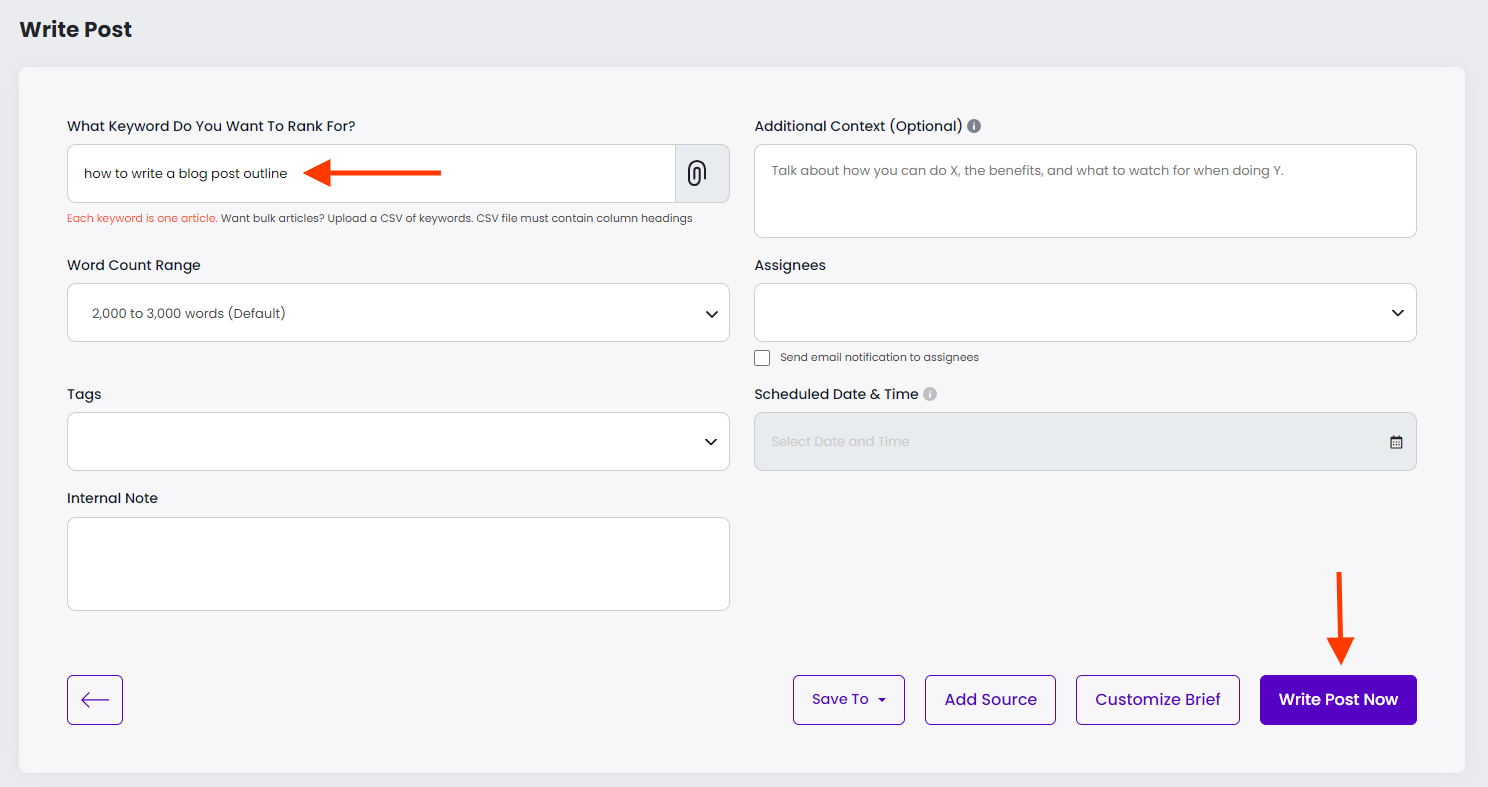

You can add context to tell the machine what to write about, who to address in the content, and what to avoid.
Creating a Blog Post Outline
RankWell automatically builds a blog post outline for you — which can be one of the most time-consuming tasks when brainstorming a new project.
The AI will create your outline based on the keywords and context that you entered.
Is BrandWell Detectable?
We ran this BrandWell-generated article through the same AI detection tool and voila!

Pricing Breakdown
ChatGPT is free, but you can subscribe to ChatGPT Plus for $20 per month and get the following benefits:
- Full access to ChatGPT even during peak times.
- Faster response times.
- Priority access to new features and improvements.
You can access the entire BrandWell family of tools — RankWell, WriteWell, Content Intelligence, Plugins — for only $249 per month.


- Brainstorming keywords and topics.
- Researching, outlining, and writing articles.
- Adding links, featured images, and metadata.
- Optimizing on-page SEO elements.
- Checking for grammatical errors, plagiarism, and AI detection.
- Formatting headers and subheaders.
- Embedding tweets and YouTube videos.
- Publishing completed articles on your WordPress or Shopify blog.
With BrandWell, you can maintain a busy publishing schedule without doing any of the work yourself. At a cost between $15 to $25 per long-form article that is well-written and ranks high in Google, that’s one heck of a deal.
To recap:
ChatGPT
- Potential to generate creative ideas quickly.
- Great for generating short-form content for social media.
- Easily adaptable to different writing styles or tones.
- Cannot write long-form blog posts.
- Limited reliability in generating accurate information without detailed instructions.
- Possible biases are present due to training data used during development.
- Does not provide sources for its responses.
BrandWell
- A combination of three AI engines with natural language processing (NLP) techniques tailored specifically for SEO purposes.
- Complete end-to-end publishing tool.
- RankWell long-form writer can generate a 2,000-word article in minutes, with just a single keyword input.
- RankWell SEO suite comes with a keyword research tool, topic reports, content briefs, NLP salience scoring, SEO checklist, optimization audits, plagiarism scanner, and AI detector.
- WriteWell featuring AIMEE and 40+ AI Agents can create all types of content.
- Ease of integration into popular platforms like WordPress and Shopify through plugins.
ChatGPT and BrandWell are vastly different AI tools. One is a chatbot that can generate human-sounding text and the other is an all-in-one brand growth platform focused on creating and publishing high-ranking content to meet one objective: to grow your brand.
If you’re looking for an AI writing assistant, ChatGPT may work for you. But if you want to scale your content publishing, build brand authority, and get real results, investing in a solution like BrandWell makes a lot more sense.
BrandWell vs ChatGPT: Ready to Make Your Choice?
The right choice between these two tools depends on your specific needs as a content creator. Take into account the kind of content you publish, your desired viewers, and how much personalization is necessary for your projects.
The best application of AI is to scale SEO content creation in a way that makes the human writer more productive — not to replace them.
BrandWell is hands-down the most cost-effective automated publishing tool for marketing content. If you want to seriously scale your content production at a minimal cost, sign up here to get started today.

UNLOCK YOUR POTENTIAL
Long Headline that highlights Value Proposition of Lead Magnet
Grab a front row seat to our video masterclasses, interviews, case studies, tutorials, and guides.


